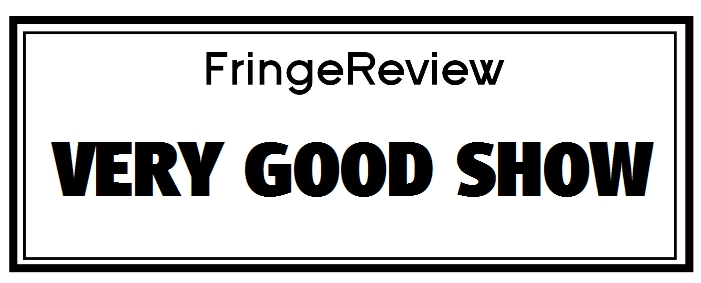Edinburgh Fringe 2023
June
Gen Z Gender Collective

Genre: LGBTQ+, Solo Performance, Theatre
Venue: Greenside
Festival: Edinburgh Fringe
Low Down
Billy was a star on the drag scene but was forced to quit due to an unsexy chronic illness. He wants to relive his youth and experience the thrill of being a performer once more. He starts on a path that will call into question his beliefs and certainties.
Review
The stage is set with a cluttered dressing table, some big bags and boxes that look carelessly discarded. Clothes are strewn around the place. A frilly red lace basque with suspenders and a well-worn leather jacket are immediately noticeable.
There is an announcement over the PA system asking us to welcome Miss June on stage. She makes an entrance, dances, and lip-syncs to a song, then falls unceremoniously on her backside. June limps to the dressing table, takes her make-up off, listens to the phone messages, and slowly we are introduced to Billy/Miss June’s world.
We learn about Billy’s best friend Kim, hear about the rheumatoid arthritis that ended Billy’s drag career, and find out that Billy is now a cashier in a supermarket. Yet again, he is late for work. He seems to care little about anyone else than himself. We become privy to his inner monologue, his relentless judging of people. Billy is bitching about colleagues and customers. He is often mean, superficial, and misogynistic, clearly lacking self-awareness, compassion, or sensitivity. He still behaves as if he were the new hot thing on the gay scene, the fabulous queen who can take her pick.
A customer sees in the cashier the former star, tries to make conversation, but Billy blocks it. He is not ready to be a realist. Instead, he wallows in self-loathing. He calls himself disrespectful, abusive terms. We realize very quickly that Billy’s number one problem is himself, but he expects other people to fix him. There were countless medical professionals who misdiagnosed his condition, at least in his mind. Some are openly homophobic, which just hardens his stance. Then there are those who give him decent advice, but Billy is in denial and doesn’t want to be counselled on lifestyle choices, not even by his friend Kim, who is a doctor of some sort. The audience never really finds out her exact discipline, but ‘psychiatry’ definitely hangs in the air. She is very patient and supportive, but even she gives up at one point.
Billy is destructive. He had a terrible childhood and can’t leave it behind. He is angry at the cards that have been dealt to him. He never sees the good in his world. He never relishes that he had a fabulous career, he never appreciates Kim, who is more a self-sacrificing wife than just a friend to him, and he never sees that he got away lightly with his RA in only his left foot. He can still walk, only occasionally using a stick, and he can work. He is not wheelchair-bound, he has not had dozens of operations and metal implants that set the airport scanners off and cause pain whenever the weather changes. His pathetic self-pity leads him to drink. In his warped reality, he feels he deserves better, and only booze makes it bearable. Yet, men are genuinely interested and seek a serious romantic relationship with him. Billy, though, can’t cope with anything that isn’t a frigid hook-up. He is afraid of feelings, of love, and actively ruins any chances of happiness.
Billy believes the world owes him, especially a comeback. He thinks that despite the fact he is a complete mess, he can get back on stage by sleeping with the right guy. So he hooks up with a former promoter and lover, Jason, only to find out that time has moved on. Jason has his life sorted and a steady partner. Still, for old time’s sake, he gives Miss June another chance. Of course, Billy makes a mess of this as well. Instead of preparing for his comeback, he self-sabotages with endless conversations in the mirror in which he puts himself down. Then there is drink and some undefined pills that he didn’t get on the NHS. Billy is not where he is because of RA; he is there because of Billy. Only when the long-suffering Kim closes the door in his face does Billy slowly wake up. He gets real at last, and that leads him back on stage, this time as a disabled, mature drag queen.
Sherzadae Moeed has written an insightful and questioning play. It speaks to his talent as a writer that he manages to create a realistic world of a down-and-out middle-aged, disabled queen when he himself is still such a very young man. Stephen Ledger is a promising young actor who will continue his training with an MA in acting at Rose Bruford College in October. Generally, he manages to make the audience forget that he is a beautiful, fit young man and convinces us that he is the old haggard queen as which Billy describes himself. His performance is strong and confident, building a good rapport with the audience as and when needed. Maddie Hurley’s direction is very visual and delicate. They are also a co-founder of the company, Gen Z Gender Collective, a theatre group comprised of recent Durham University graduates.


















































